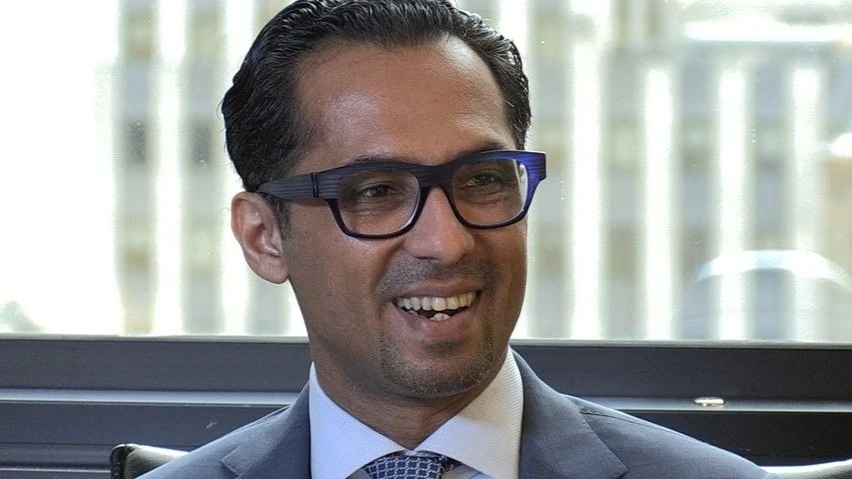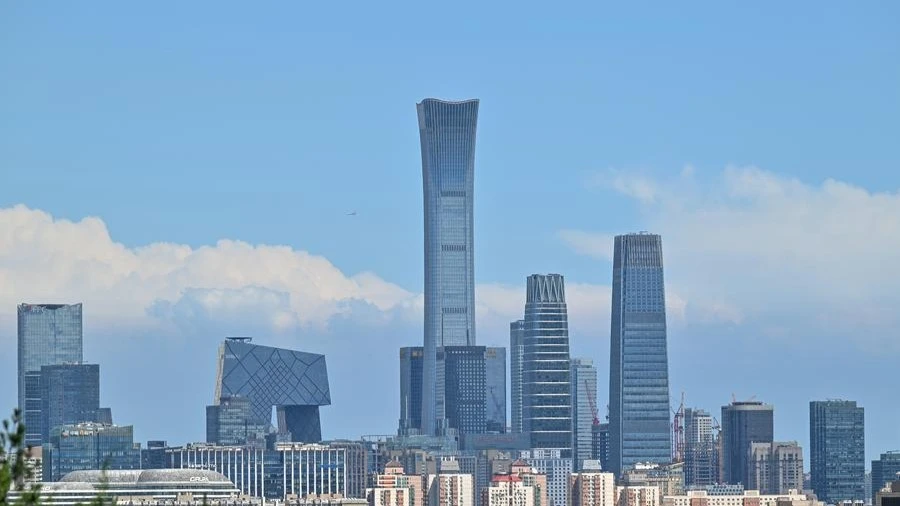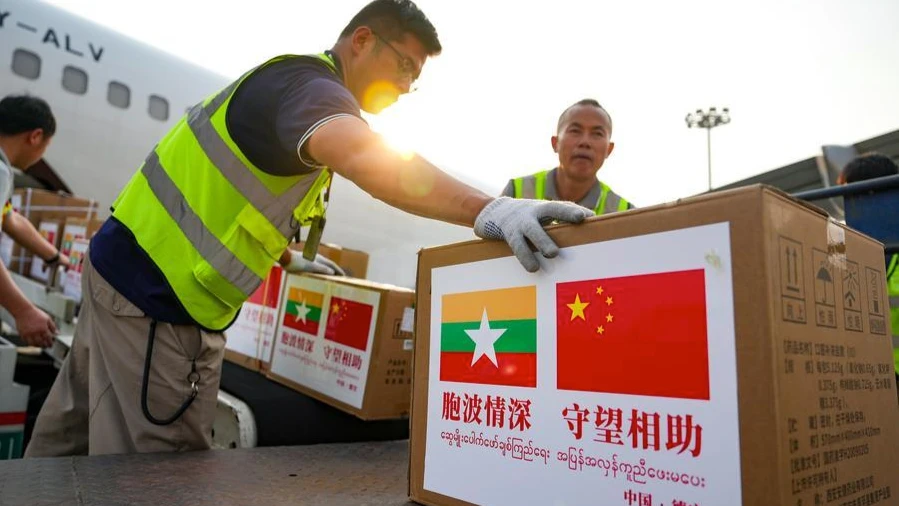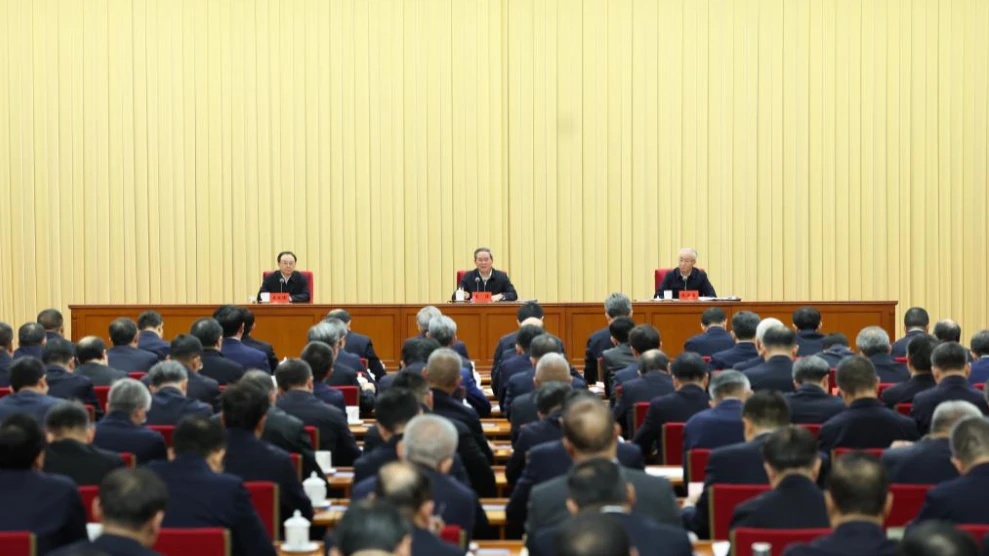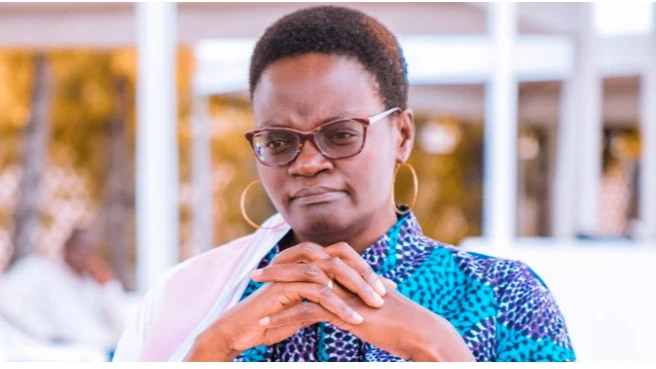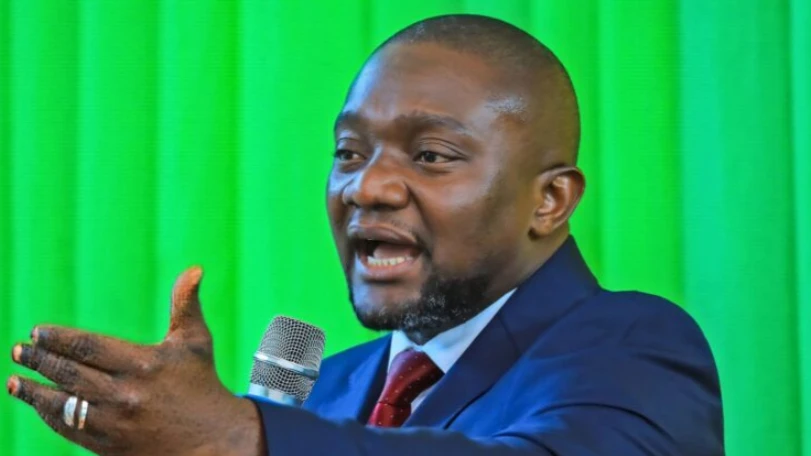Why Biden, Trump oppose Japan's takeover of US steel
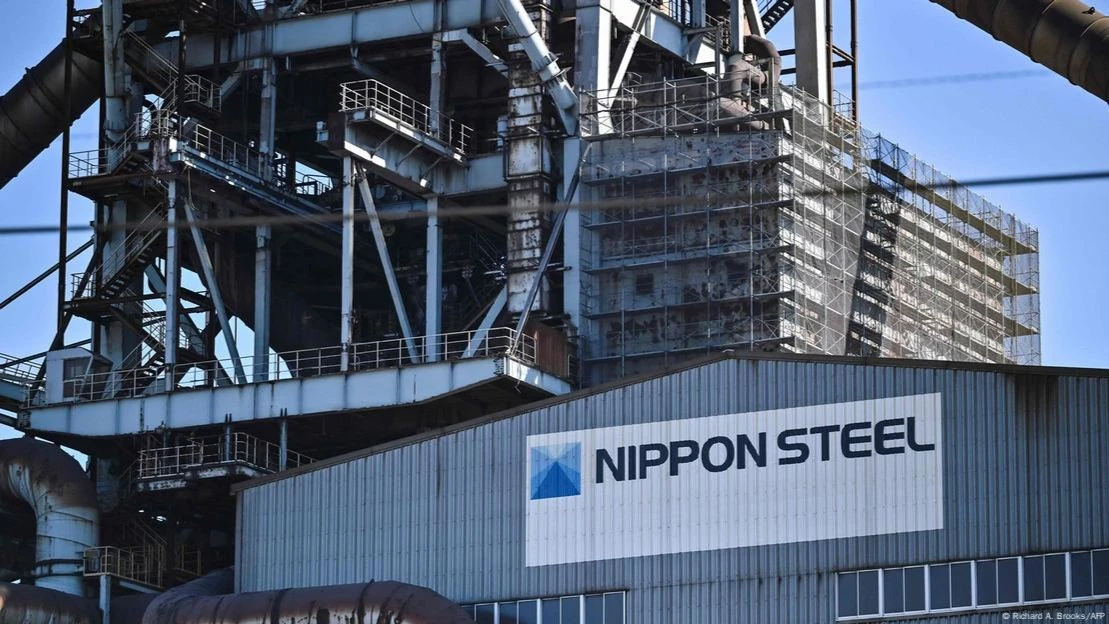
US President Joe Biden has vetoed Nippon Steel's $14.9-billion takeover bid for its American rival, US Steel. Amid bipartisan opposition to the merger, DW asks why US politicians and regulators are concerned.
NEW YORK
After months of opposition, US President Joe Biden on Friday blocked the proposed buyout of the United States Steel Corporation, or US Steel, by Japan's Nippon Steel.
The second-largest US steelmaker had previously approved the $14.9-billion (€14.5-billion) takeover bid, saying it would help protect the ailing firm from intense competition from abroad, including China.
Nippon Steel had hoped the acquisition would help hike its global steel output by nearly a third, to 85 million tons.
However, the merger became a significant issue for Democrats and Republicans in November's US presidential election, as Pennsylvania, where US Steel is headquartered, was a critical swing state.
In an attempt to protect American jobs, the United Steelworkers union fiercely opposed the transaction.
Biden has cited national security concerns and risks to key supply chains as his main reasons for vetoing the purchase.
"This acquisition would place one of America's largest steel producers under foreign control and create risk for our national security and our critical supply chains," Biden said in a statement. "That is why I am taking action to block this deal."
The president previously said that critical industries, like the steel sector, must remain under the control of domestic players.
In December, the Committee on Foreign Investment in the United States (CFIUS) — which reviews mergers and acquisitions of US firms by foreign entities — failed to reach a consensus on whether to approve the deal and referred the decision to Biden, who leaves office on January 20.
The panel, led by Treasury Secretary Janet Yellen, warned the buyout could lead to a cut in US steel output, which would cause supply shortages, affecting the transport and energy sectors the most.
CFIUS warned the deal could scupper Washington's attempt to quash the dumping of cheap steel from China, where heavy industries receive massive subsidies from the Beijing government.
According to US newspaper The Washington Post, the committee was also concerned Nippon Steel could shift production to its sites in Brazil, Mexico and India after gaining control of US Steel.
Senior White House advisers had reportedly tried to persuade Biden to proceed with the purchase, as it would represent a sizable investment in an ailing US company. They also thought a veto could hurt ties with Japan, one of Washington's closest allies in the Indo-Pacific.
Both Biden and former President Donald Trump implemented protectionist policies in recent years to safeguard the US steel sector against a global oversupply, which has driven down prices. The measures included 25% tariffs on imported steel, while China was singled out for unfair trade practices.
Biden's veto is unlikely to be overturned by President-elect Trump, who campaigned on reviving US heavy industry, and last month wrote on his Truth Social social messaging platform that he was "totally against the once great and powerful US Steel being bought by a foreign company."
Trump has promised to use a mix of more tariffs and tax incentives to protect the US steel sector.
In a last-ditch attempt to get the deal approved, Nippon Steel proposed giving Washington a say in any potential production cuts at US Steel, Reuters news agency reported earlier this week, citing a source familiar with the deal.
In December, Nippon Steel defended the merger, promising "significant" investments in US Steel's facilities and employees to "ensure a vibrant future for American steelmaking." The firm said it remained "confident that the acquisition will protect and grow US Steel, creating the best steelmaker with world-leading capabilities for the benefit of American workers and customers."
Nippon Steel has pledged over $2.7 billion in capital investment for US Steel's facilities in Pennsylvania and Gary, Indiana, and offered to move its US headquarters to Pittsburgh, where US Steel is based. It has also promised to honor existing agreements with unions.
In November, Japanese Prime Minister Shigeru Ishiba urged Biden to approve the merger to avoid weakening ties between the two countries.
Both Nippon Steel and US Steel have insisted the deal poses no national security concerns and vowed to pursue legal action, claiming US officials failed to follow proper procedures while reviewing the acquisition.
While it may preserve the independence of US Steel, Biden's veto could leave the steelmaker struggling to secure the capital and technology needed to modernize.
It would leave the firm unable to compete against larger, better-funded global steelmakers like ArcelorMittal or Chinese rivals.
US Steel could now face difficulties finding a buyer for the entire company. A cash and stock deal in August 2023 by rival Cleveland-Cliffs was worth around half of the amount of the Nippon Steel bid. At the time, US Steel rejected the union-backed deal, and a few months later approved the Nippon Steel merger plan.
By blocking the acquisition, Biden is also signaling to other international investors that they may face political and regulatory hurdles when bidding for US firms deemed critical for national security.
The decision is also likely to widen China's grip on the global steel sector and could even prompt the European Union to seek foreign investments from the likes of Nippon Steel for its steel players.
Western allies are waking up to the threat on NATO's borders and the increased ties between Russia and China. But the alliance's goal to work more closely with Asian partners faces challenges.
Russia and China have been conducting joint naval drills and war games in recent weeks, in a show of strength and camaraderie for the regional and Western audience.
Several experts told DW that Moscow's intentions were to distract the United States from Europe and weaken the NATO alliance, while China intended to spook regional adversaries and learn lessons from Russia's war experience.
"Russia wants the US to focus more on the Indo-Pacific in the hope that it will reduce military deployment and its support to Europe," said Ying-Yu Lin, a military expert at Tamkang University in Taiwan.
At least 15 countries were invited to observe the drills, but China was the key partner.
"We pay special attention to strengthening military cooperation with friendly states," Russian President Vladimir Putin said at the launch of the exercises in early September, as if brandishing Moscow's defense cooperation with Beijing as a counterweight to the Western security alliance.
But these exercises, Russia's largest in 30 years, aren't the first with China this year. In July, Russian and Chinese bombers flew together for the first time in international airspace off the US coast of Alaska, while in Europe, Chinese soldiers staged joint anti-terrorism exercises in Belarus, on NATO's eastern flank — just kilometers away from the border with Poland.
China's increased presence on NATO's outer edges may be, in part, in response to NATO plans to increase its cooperation with key regional partners Japan, South Korea, Australia and New Zealand, also known as the IP4.
NATO has said developments in the Indo-Pacific region "can directly affect Euro-Atlantic security," and the idea of collaborating with the partners is to "enhance their mutual situational awareness of security developments" in the two regions, in part due to the growing influence of China, Russia, North Korea and Iran.
Outgoing NATO chief Jens Stoltenberg has publicly reprimanded China's alleged military support to Russia. NATO has described China as "a decisive enabler of Russia's war against Ukraine" for its "so-called 'no limits' partnership and its large-scale support for Russia's defense industrial base," which includes machine tools, microelectronics and other technology that allow it to make weapons.
Reacting to the IP4 cooperation plans in July, Lin Jian, a spokesman for the Chinese Foreign Ministry, accused NATO of "breaching its boundary, expanding its mandate, reaching beyond its defense zone and stoking confrontation."
But experts in Europe have said there is no appetite in NATO to expand its remit and offer actual security guarantees to eastern partners like Article 5 of the NATO treaty, which calls on every member state to provide mutual defense through military and political means if a member state is threatened by an external country.
"Diplomatically, there is an objective to maintain the status quo and not irritate China, as China has indicated multiple times that NATO cannot expand to the Indo-Pacific," said Sari Arho Havren, a specialist in China's foreign relations at the Royal United Services Institute think tank, based in Brussels.
Ian Lesser, who heads the Brussels office of the German Marshall Fund of the United States think tank, said there is currently no consensus on expanding the geographical area of the alliance.
"NATO is very focused on what is in its areas of interests and responsibility," and is aiming for "obvious and easier" areas of cooperation that don't engage the question of geography and the key four Indo-Pacific partners.
"The easiest thing for NATO is to cooperate with the IP4 on more global concerns that do not have geographic boundaries, such as cybersecurity, information security, intelligence sharing and counterterrorism," he said.
However, the Western alliance faces a whole host of challenges, including how far it can go in provoking China, which happens to be the biggest trading partner of both its Asian partners and also of the European Union.
Since Russia launched its full-scale invasion of Ukraine in early 2022, and amid growing cooperation between Moscow and Beijing, NATO has sought to highlight the importance of its Asian partners, particularly the IP4. The four countries attended the yearly NATO summit for the first time in 2022, months after Ukraine’s invasion, and have since become regulars.
NATO's strategy, while still in the nascent stage, has so far included sharing notes on Russia's aggression in Ukraine, the growing ties between Moscow and Beijing and China's stated sovereignty claims in the region and the security situation in the Korean Peninsula.
NATO member states are additionally concerned about Taiwan — a key supplier of semiconductor chips that power everything from electric vehicles to phones. The island state, which China claims as a breakaway province, is under constant threat as Beijing aims to reunite it with the mainland.
In July, White House national security adviser Jake Sullivan told a defense gathering that NATO allies will be launching four new projects with its Indo-Pacific partners focused on artificial intelligence, disinformation and cybersecurity, but also crucially on Ukraine. So far, NATO hasn't provided any further details.
"I would say that the deepening ties are a process, and NATO and IP4 coordination has already created a strong basis,'' said Arho Havren.
For instance, Japan and NATO are in the final stages of setting up a dedicated line for sharing highly confidential security information, while the European allies have come to appreciate the South Korean defense industry, particularly its ammunition production, which has been useful in indirectly supplying Ukraine.
Ying-Yu Lin said NATO's individual agreements with its Asian partners is due to the differences among them, and general cautious approach toward China in the region. "They don't agree on everything," he said.
That's also true for the Western allies, who are still deciding on the extent of their cooperation with their Asian partners. NATO member states have been careful in how far they'll go on their own. France, for instance, even vetoed the opening of a NATO liaison office in Tokyo last year, calling it a "big mistake."
NATO also wants to avoid stretching itself too thin, at a time there is a war on its eastern flank and it needs to bolster its own defenses.
"It is also a resource matter — European NATO allies cannot realistically expand their commitments to cover the Indo-Pacific," said Arho Havren, pointing out that many European nations still allocate less than recommended 2% of the national GDP on defense spending "and lack military capabilities even at home."
Top Headlines
© 2025 IPPMEDIA.COM. ALL RIGHTS RESERVED




